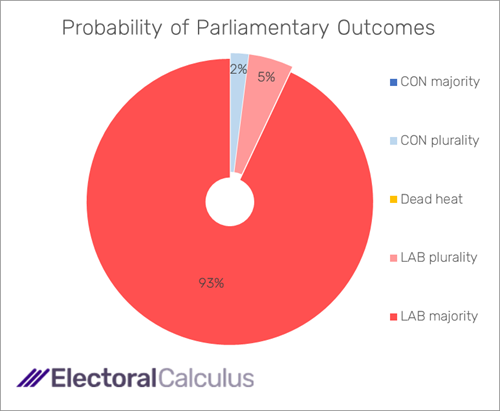Winning core seats that return Tory MPs at election after election is a central aim of Rishi Sunak's electoral strategy, since they constitute more than four-fifths of the seats needed for a parliamentary majority. The foundation of Boris Johnson's victory at the 2019 election were 268 seats that had consistently returned a Tory MP at every election since 2010, and some for decades longer. However, the loss of popular support under Sunak's two immediate predecessors means that many of these core seats can no longer be counted as Tory seats.
If voters distributed their support in a general election as they did in the December average of opinion polls, Conservatives would lose almost half their core seats. Labour would gain 121 MPs and the Liberal Democrats 4 MPs. Moreover, dozens of the 143 core seats that the Conservatives retained would be held by a narrow margin. Hence, if the Labour lead lengthened to where it was in November, Labour would take a majority of constituencies that were once Tory strongholds.

The irony of the Tory position is that while it is losing seats to Labour the party is losing core voters to the ranks of the don't knows or won't vote. This group is likely to be less partisan Conservatives who would welcome an end to party infighting, an unstable cabinet and policy U-turns which Sunak has yet to achieve.
Since many core Conservatives voters have defected to the right-wing Reform Party, the government is making a big issue of illegal immigration in hopes of winning back their votes. On the basis of November polls (see my analysis), this could enable the Tories to hold on to 70 or more core seats, not enough to defeat Labour but a better showing than John Major produced when the Conservatives last lost office in 1997.
The critical condition for winning the vote of Reform supporters is out of the prime minister's hands. Since parties that do not nominate candidates can't win votes, the Reform Party leaders must agree not to put up candidates in core Conservative seats. This happened in 2019 when Nigel Farage's group gave priority to getting Brexit done and stopping Jeremy Corbyn. It stood down candidates in hundreds of Conservative core and marginal seats.
This year the Reform leadership is giving priority to punishing the Conservative government for failing to take back control over Britain's borders by reducing immigration, a major concern of Brexit voters. Richard Trice, the current leader of the Reform Party, has promised that the party will fight all 632 British constituencies at the next election. If Nigel Farage decides to join up, this gives the Reform Party a personality to add to the electoral appeal of its anti-immigration platform.
Sir Keir Starmer can observe the Tory predicament with pleasure, as it offers Labour a win-win outcome. Any Tory gain from a successful Sunak appeal for votes on stopping immigration could be offset by moderate Tories either not voting or switching to the Liberal Democrats or Labour. A failure to handle immigration could boost Reform votes and help Labour gain core Tory seats. If Sunak does nothing, on current poll figures there is a 99 percent probability of Labour taking control over Downing Street within the next twelve months.
Richard Rose is Britain's senior psephologist and an expert on party government. His work has recently been appreciated in a new book 'The Problem of Governing: Essays for Richard Rose' published by Palgrave.